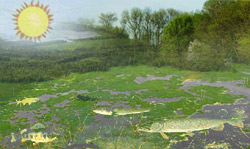
In a recent study, a team of researchers has discovered a group of stress-related proteins showing how plants cope with the intense light to avoid sunburn.
The finding could prove quite beneficial in the recent future and help the biotechnologists develop crops that can better cope with hotter, drier conditions occurring in climate change.
The study, titled "Subset of heat-shock transcription factors required for the early response of Arabidopsis to excess light," was led by researchers from Dartmouth, the Salk Institute for Biological Studies and Australian National University.
Excessive or too little sunlight or rapidly fluctuating light conditions cause stress to plants, which have sophisticated control systems to utilize light energy for carrying out photosynthesis and simultaneously protect themselves from sunburn from very bright sunlight.
Moreover, Plants execute these regulations mainly by regulating nuclear gene expression and multiple intracellular signaling pathways, which are supposed to play a role in the genomic response of plants to stress, but the processes are not well understood.
In this study, Professor Hou-Sung Jung and his colleagues showed that a group of transcription factors called Heat Shock Transcription Factors are responsible for fast responses of plants to changes in light intensity-from light conditions that are optimal for photosynthesis to high intensity light responsible to cause sunburn.
The findings are published in the journal PNAS.
-With inputs from ANI
|
|


Comments: